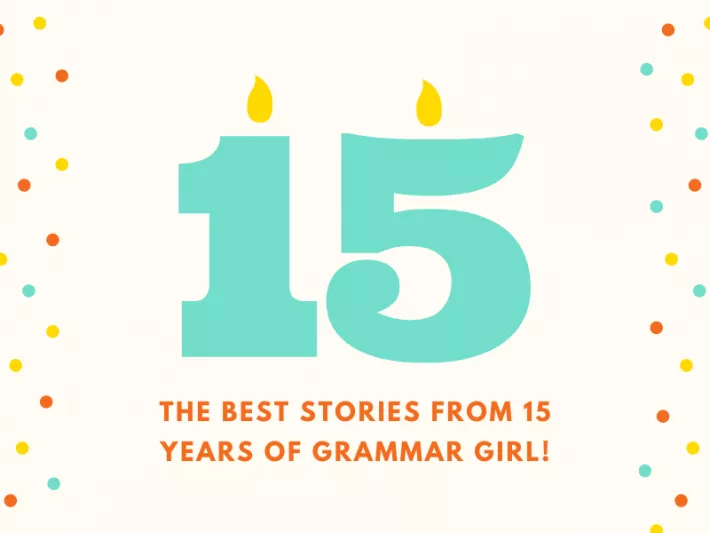When I jotted some ideas down on a napkin in a coffee shop called The Kind Grind on the beach in Santa Cruz, California, I never thought I’d be doing it this long or even that Grammar Girl would become my full-time job. I am so grateful to all of you because the fact that you listen makes everything I do possible.
To celebrate, I’m going to take you on a quick tour of some of my favorite stories from over the years and some of the best tips—the ones I use myself in real-life when I’m writing.
Harbinger
One of my most favorite stories is the origin of the word “harbinger” —something that warns of a future event—because it led me to discover that there used to be a royal position called the Knight Harbinger who set up accommodations for the royal household when they traveled, and (even more fun) there was also a Keeper of the Barges and a Keeper of the Swans—the swans! Imagine that being your job. I still think about this all the time.
Ghost words
Another favorite story comes from the episode on ghost words: words that only made it into dictionaries by accident and therefore are said to have “no real existence,” according to a lexicographer in 1886. The one that always makes me laugh is “dord” which was supposed to be “D or d,” (capital D or lowercase d) the abbreviation for “density,” but somebody misread it and ran all the letters together into a word. It sounds so funny: “dord.” I love it!
‘Historic’ versus ‘historical’
One of the more straightforward tips I use all the time in my own writing is remembering the difference between “historic” and “historical” by thinking of that “al” on the end of “historical” as standing for “all things” because all old things are historical. It’s only important things that are historic.
How to spell ‘bureaucracy’
Another of my favorites that I use all the time is how to remember to spell “bureaucracy”—a word many people tell me they struggle with. This is a weird tip, but it works for me. I think of a burrow, sitting behind a desk, tapping perfume behind its ears. The first three letters of “bureaucracy” are “bur” like in burrow. The next three letters are “eau,” like perfume—eau de office carpet—and I can remember the “cracy” part on my own. Burrow, perfume, cracy. B-U-R-E-A-U-C-R-A-C-Y. I haven’t spelled it wrong once since coming up with this trick.
Grimm’s law
Another surprising tidbit I love is that the Brothers Grimm of fairy tale fame were also accomplished linguists, so much so that Jacob Grimm has a linguistics law named after him: Grimm’s law, which describes how consonant sounds changed in a systematic way between very early languages. So surprising! And now you can think of linguistics when you watch Snow White or read Cinderella to your kids.
Smitten
Another bit of etymology that surprised and delighted me is from the word “smitten,” which seems like such a cuddly, happy word (I. Am. Smitten.) but is actually the past tense of the verb “to smite,” as in to kill or injure someone by hitting them. “Smite” is also one of those weird verbs that has two acceptable past-participle forms, so it has both “smitten” and “smote,” and “smote” is usually the one used to describe violence and, “smitten” is usually the one used to talk about being struck by strong feelings of love or affection, but still … I bet most people who talk about being smitten with a kitten or a new paramour don’t know the word has such a violent origin. I sure didn’t!
Words for colors
The whole “Words for Colors” episode that came out in 2018 is one of my all-time favorites, and I won’t ruin it for you because you really should listen to the whole thing because every bit is fascinating, but I especially love that the name of the color magenta comes from the Battle of Magenta. The synthetic dye that makes the color magenta was invented by a French chemist in 1859. At first he called it “fuchsine,” after the fuchsia flower, but he changed it pretty quickly to “magenta” to honor a French military victory over the Austrians near the northern Italian town of Magenta. Etymonline says the victory “advanced the cause of Italian independence and fired the imagination of European liberals,” but now the Battle of Magenta sounds to me like something that should be a sequel to “The Devil Wears Prada.” Here’s how I imagine it:
“Miranda Priestly brings back her smart, but sensible assistant Andy, to help save the day when her spurned advisor Nigel schemes to replace what should have been the new color of the year—magenta—with puce. Can they stop him, or will they have to try make it work?”
‘Affect’ versus ‘effect’
No 15th anniversary Grammar Girl roundup would be complete without revisiting the original “affect” versus “effect” tip and cartoon!
It was one of the first topics I did, and I commissioned a cartoon from Len Peralta to go with it of Aardvark—Squiggly’s blue friend—who shows up in many of my example sentences. For a while, you could get the cartoon and caption on a mouse pad: “The arrow affected Aardvark. The effect was eye-popping.”
“Arrow,” “affected,” and “Aardvark” all begin with an A. “Effect” and “eye-popping” both begin with an E. By comparing your troublesome sentence to these two sentences, you can usually see whether you need “affect” with an A or “effect” with an E.
Today, I’m more likely to use the R-A-V-E-N tip myself, in which the letters stand for “affect” verb, “effect” noun, but I still hear from many people who use the trick that was in that early cartoon.





